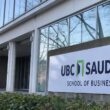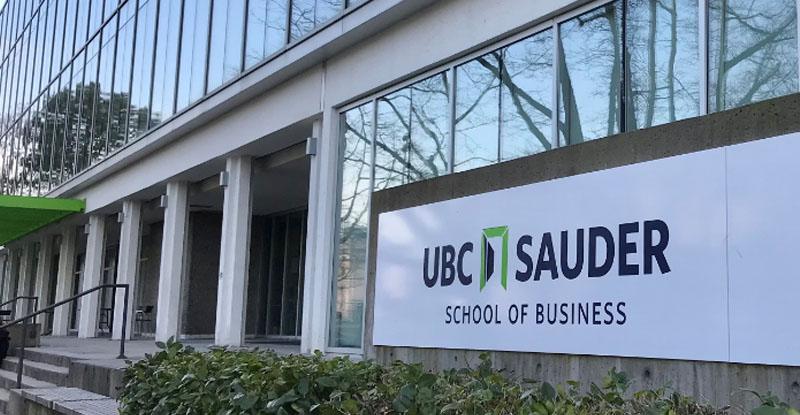The University of British Columbia’s Sauder School of Business offers one of the most valuable scholarship opportunities available to international MBA students through its Regional Top Talent Full Tuition Scholarship. This comprehensive guide explores everything prospective applicants need to know about this significant funding opportunity, including eligibility requirements, application procedures, selection criteria, and strategies for developing a competitive submission.
Understanding the UBC Sauder School of Business
The Sauder School of Business at the University of British Columbia has built a strong reputation as one of Canada’s leading business schools. Located in Vancouver, British Columbia, the school sits on the traditional territories of the Musqueam people, in one of the world’s most beautiful and livable cities.
Vancouver offers a unique environment for business education. The city serves as Canada’s gateway to Asia-Pacific markets, creating distinctive opportunities for students interested in international business, particularly with Asian economies. The region hosts a diverse population, a thriving technology sector, strong natural resources industries, and a growing entrepreneurship ecosystem.
UBC itself ranks among the world’s top 40 universities across multiple international rankings. The Sauder School of Business holds prestigious accreditations from AACSB International, EQUIS, and AMBA, placing it among an elite group of business schools worldwide holding all three accreditations simultaneously.
The MBA program at Sauder emphasizes experiential learning, global perspective, and sustainability focus. Class sizes remain relatively small compared to many North American programs, typically around 100-120 students per cohort, allowing for more personalized attention and stronger community bonds.
The Regional Top Talent Scholarship Explained
The Regional Top Talent Full Tuition Scholarship represents Sauder’s commitment to attracting exceptional candidates from specific geographic regions. The scholarship covers full tuition for the duration of the MBA program, which represents substantial financial support given that international tuition at Sauder typically exceeds $100,000 CAD for the full program.
This scholarship specifically targets students from underrepresented regions in the MBA program. The exact regions eligible vary by application cycle based on the school’s enrollment goals and diversity objectives. Recent cycles have included regions across Africa, Southeast Asia, Latin America, and other areas where Sauder seeks to increase representation.
The scholarship covers tuition only. Recipients remain responsible for living expenses, books, program materials, and other costs associated with living in Vancouver and participating in the MBA program. However, eliminating tuition removes the largest single expense and makes the program financially accessible to candidates who might otherwise find it unaffordable.
Beyond financial support, scholarship recipients gain recognition as top regional talent, which can enhance their profile within the Sauder community and with potential employers. The designation signals to classmates, faculty, and recruiters that the school identified these individuals as exceptional candidates from their regions.
Eligibility Requirements and Criteria
Understanding who qualifies for consideration helps prospective applicants determine whether investing time in an application makes sense for their particular circumstances.
Geographic Requirements
The scholarship targets specific regions that vary by application cycle. Prospective applicants must check the official Sauder MBA admissions website to confirm whether their country or region qualifies for the current cycle. The school typically announces eligible regions when applications open for each intake year.
Generally, the scholarship focuses on regions where Sauder has lower enrollment numbers and wishes to increase diversity. This often includes countries across Africa, parts of Asia, Latin America, and select other regions. However, eligible regions can change between application cycles based on enrollment patterns and strategic priorities.
Academic and Professional Requirements
Applicants must meet all standard MBA admission requirements for the Sauder School of Business. This includes holding a four-year undergraduate degree or equivalent from a recognized institution, demonstrating strong academic performance throughout their studies, and showing relevant professional experience.
The program typically expects candidates to have at least two years of post-graduation work experience, though exceptional candidates with less experience may receive consideration. Work experience should demonstrate increasing responsibility, leadership potential, and clear career progression.
GMAT or GRE Scores
Competitive candidates typically present strong GMAT or GRE scores. While Sauder does not publish absolute minimum scores, successful scholarship recipients generally score well above program averages. Recent admitted classes have had median GMAT scores around 660-680, and scholarship recipients often score higher.
However, test scores represent just one component of the application. Strong professional accomplishments, compelling personal story, demonstrated leadership, and clear post-MBA goals can partially compensate for scores below the highest ranges.
English Language Proficiency
International applicants whose first language is not English must demonstrate English proficiency through TOEFL, IELTS, or other accepted tests. Minimum scores vary by test, but competitive candidates typically exceed these minimums substantially. Strong English communication skills prove essential for success in the program and in post-graduation careers.
The MBA Program Structure and Experience
Understanding what the scholarship funds help applicants evaluate whether the program aligns with their goals and needs.
Program Duration and Format
The Sauder MBA is a full-time, 16-month program beginning in August and concluding in November of the following year. This accelerated timeline allows students to return to the workforce relatively quickly while still gaining a comprehensive business education.
The condensed format means the program moves quickly and demands significant commitment. Students take a full course load throughout, with limited breaks. The intensity requires focus and time management, but allows earlier return to earning potential compared to traditional two-year programs.
Curriculum Design
The program is divided into several phases. The initial months cover core business fundamentals across areas like accounting, finance, marketing, operations, strategy, and organizational behavior. These courses ensure all students share a common foundation regardless of their pre-MBA backgrounds.
After completing core requirements, students select elective courses aligned with their career interests. Sauder offers specialization options in areas including business analytics, entrepreneurship, finance, strategic management, and others. Students can also pursue dual specializations depending on their goals.
Experiential Learning Components
Sauder emphasizes learning by doing. The program includes several experiential components where students work on real business challenges. The Global Immersion Experience takes students to another country for an intensive study of business in that context. Past destinations have included locations across Asia, Europe, and the Americas.
The MBA field study places student teams with organizations to work on actual business problems over several months. These projects provide practical experience applying classroom concepts while building relationships with potential employers.
Career Development Support
The Sauder Career Management Centre works specifically with MBA students on career planning, job search strategies, networking, interview preparation, and offer negotiation. The center organizes recruiting events, connects students with alumni, and provides individual coaching throughout the program.
For international students, the center offers specific support in navigating Canadian job markets and addressing work permit processes. Canada’s immigration policies generally allow international students to work in Canada for up to three years after graduation, providing valuable time to establish Canadian work experience.
Application Process and Timeline
The scholarship application integrates with the regular MBA admission application. Understanding the timeline and process helps candidates plan effectively.
Application Deadlines
Sauder typically operates on a rolling admissions basis with several application rounds throughout the year. Earlier rounds generally offer better chances for scholarship consideration since available funding decreases as spots fill.
For maximum scholarship consideration, applying in the first or second round proves advantageous. Specific dates vary by intake year, but first rounds typically close in October or November for programs beginning the following August, with second rounds closing in January or February.
Required Application Materials
The MBA application includes several standard components:
Resume or CV: This should present your work experience, education, accomplishments, and relevant activities clearly and concisely. Focus on achievements and impact rather than just listing responsibilities. Quantify results where possible.
Academic Transcripts: Official transcripts from all post-secondary institutions attended demonstrate your academic preparation. Strong grades strengthen your application, though they represent just one factor among many.
GMAT or GRE Scores: Official test scores must be sent directly from the testing agency. While you can self-report scores in your application, official scores must arrive for your application to be complete.
English Proficiency Test Scores: For non-native English speakers, official TOEFL, IELTS, or other accepted test scores must be submitted.
Essays and Short Answer Questions: The application includes several essay questions and shorter responses. These provide opportunities to explain your motivations for pursuing an MBA, your career goals, what you bring to the Sauder community, and how you have demonstrated leadership.
Letters of Recommendation: Typically, two recommendations are required from individuals who can speak to your professional abilities, leadership potential, and personal qualities. Choose recommenders who know your work well and can provide specific examples rather than general praise.
Video Essay: Some application cycles include a video essay component where you respond to prompts on camera. This helps the admissions committee assess your communication skills and personality beyond written materials.
Scholarship Consideration
You do not submit a separate application for the Regional Top Talent Scholarship. All applicants from eligible regions who meet scholarship criteria receive automatic consideration during the admissions review process. The admissions committee identifies top candidates from each eligible region for scholarship awards.
This means your regular MBA application serves as your scholarship application. Every component matters for scholarship consideration, not just academics and test scores. Your essays, recommendations, interview performance, and overall application quality all factor into scholarship decisions.
Selection Criteria
Understanding what Sauder values in scholarship recipients helps you present your strongest case.
Academic Excellence
Strong academic performance indicates you can handle the program’s intellectual demands. The committee looks at your undergraduate grades, the rigor of your academic program, grades in quantitative courses, particularly, and GMAT or GRE scores.
However, academic credentials alone do not determine scholarship awards. Many candidates present strong academics, so other factors often prove more decisive in scholarship decisions.
Professional Accomplishments
Your work experience quality matters more than just duration. The committee evaluates the level of responsibility you have held, the complexity of challenges you have addressed, the impact you have created in your roles, and the trajectory of your career progression.
Strong candidates show clear advancement over time, increasing scope of responsibility, and concrete achievements. Perhaps you led projects that generated significant results, managed teams successfully, or solved important problems for your organization.
Leadership Potential
The scholarship targets future leaders, so demonstrated leadership ability weighs heavily. This might show through formal leadership roles, but can also appear in informal influence, mentoring others, driving initiatives without formal authority, or organizing communities around shared goals.
The committee wants to see evidence that you can bring people together, inspire action, navigate challenges, and create positive change. Your leadership does not need to match a single template, as effective leadership manifests in diverse ways.
Career Clarity and Goals
Scholarship recipients typically demonstrate clear thinking about their post-MBA aspirations. The committee evaluates whether your goals make sense given your background, whether an MBA logically connects to these goals, and why Sauder specifically fits your needs.
Vague statements about wanting to “make an impact” or “become a business leader” prove less compelling than specific plans about the industry, roles, and challenges you want to address after graduation. You need not have every detail mapped out, but should show thoughtful consideration of your path forward.
Contribution to Sauder Community
The committee considers what unique perspectives, experiences, and qualities you would bring to your MBA cohort. Business schools value diversity in its broadest sense: professional backgrounds, geographic origins, personal experiences, perspectives, and interests.
Think about what makes your story distinctive. What experiences or viewpoints do you have that might enrich classroom discussions, group projects, and community life? How might you contribute to making your classmates’ MBA experience more valuable?
Commitment to Home Region
While not always explicitly stated, scholarship recipients often demonstrate some connection to or interest in their home region’s development. The committee recognizes that regional development benefits from leaders with international education who return to their home contexts or maintain connections to them.
This does not mean you must commit to returning home immediately after graduation. Many scholarship recipients build careers across multiple countries. However, showing awareness of regional challenges and interest in contributing to regional progress can strengthen applications.
Developing a Competitive Application
Creating an application that stands out requires thoughtful preparation and authentic self-presentation.
Start Early and Research Thoroughly
Begin researching the program many months before deadlines. Visit the Sauder website extensively, attend information sessions (many offered online), connect with current students or alumni if possible, and understand what makes Sauder distinctive.
Early preparation allows time for improving weak application elements. If your GMAT score falls below competitive ranges, you have time to study and retake the test. If your essays need refinement, you can develop multiple drafts and seek feedback.
Tell Your Story Coherently
Your application should present a coherent narrative about who you are, where you have been, and where you are heading. Help the admissions committee understand the thread connecting your experiences and aspirations.
This does not mean inventing an artificial story where everything fits perfectly. Real lives include uncertainties, changes of direction, and unexpected opportunities. However, you should be able to explain why you made certain choices, what you learned from various experiences, and how everything has led you to seek an MBA at Sauder now.
Be Specific and Concrete
General statements prove less memorable than specific examples. Rather than claiming you are a “natural leader,” describe a particular situation where you demonstrated leadership, the challenges you faced, the actions you took, and the results you achieved.
When discussing career goals, provide specifics. Which industry or sector? What types of roles? What problems do you want to address? Why these particular goals? The more concrete your plans, the more credible they appear.
Demonstrate Self-Awareness
Strong applications show mature self-reflection. Acknowledge areas where you want to develop. Discuss challenges you have faced and what you learned from them. Show awareness of your strengths and how you can contribute to the Sauder community.
The admissions committee understands that nobody is perfect. Candidates who present themselves as flawless can seem unrealistic or unaware. Those who show honest self-assessment while maintaining confidence in their abilities tend to make stronger impressions.
Address the “Why Sauder” Question Persuasively
Every business school wants to know why candidates chose their particular program. Generic answers about rankings or reputation prove unconvincing. Research specific aspects of Sauder that align with your goals and interests.
Perhaps particular professors teach subjects you want to explore. Maybe the Asia-Pacific focus matches your career interests. The sustainability emphasis might align with your values. Vancouver’s location could offer specific opportunities relevant to your industry. Whatever your reasons, make them specific to Sauder rather than equally applicable to any good business school.
Prepare Thoroughly for Interviews
If you advance to the interview stage, prepare extensively. Review your application thoroughly so you can discuss any component smoothly. Prepare examples illustrating your leadership, teamwork, problem-solving, and other key qualities.
Practice answering common MBA interview questions, but avoid sounding overly rehearsed. Research recent business news relevant to your industry or region. Prepare thoughtful questions to ask your interviewer that demonstrate a genuine interest in Sauder.
Common Application Mistakes to Avoid
Understanding typical weaknesses helps you sidestep problems that undermine otherwise solid applications.
Generic Applications
Applications that could apply to any business school with minimal changes lack persuasiveness. The committee can tell when candidates have not invested time understanding what makes Sauder unique. Customize your application to show a genuine interest in this specific program.
Weak Career Goals
Vague statements about future plans suggest insufficient thought about how an MBA fits your career trajectory. “I want to be a business leader” tells the committee almost nothing. Specific goals about industry, function, and problems you want to address prove more compelling.
Overemphasis on Credentials
Some candidates present impressive credentials but fail to show the person behind the resume. The committee wants to understand who you are, what you value, how you think, and what you will bring to the community. Let your personality and values show through your application.
Poor Essay Quality
Essays with grammatical errors, unclear arguments, or weak examples significantly hurt applications. Take time to develop strong essays. Seek feedback from others. Revise multiple times. The quality of your written communication matters for both admission and scholarship consideration.
Choosing Wrong Recommenders
Recommendations from prominent individuals who barely know you prove less valuable than recommendations from people who can provide detailed, specific assessments of your work. Choose recommenders based on how well they can speak to your qualifications, not their titles or fame.





